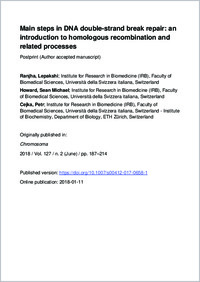Main steps in DNA double-strand break repair : an introduction to homologous recombination and related processes
- Ranjha, Lepakshi Institute for Research in Biomedicine (IRB), Faculty of Biomedical Sciences, Università della Svizzera italiana, Switzerland
- Howard, Sean Michael Institute for Research in Biomedicine (IRB), Faculty of Biomedical Sciences, Università della Svizzera italiana, Switzerland
- Cejka, Petr Institute for Research in Biomedicine (IRB), Faculty of Biomedical Sciences, Università della Svizzera italiana, Switzerland - Institute of Biochemistry, Department of Biology, ETH Zurich, Switzerland
-
11.01.2018
Published in:
- Chromosoma. - 2018, vol. 127, no. 2 (June), p. 187–214
Homologous recombination
End-joining
DNA double-strand break repair
Meiosis
Replication stress
DNA end resection
DNA strand exchange
English
DNA double-strand breaks arise accidentally upon exposure of DNA to radiation, chemicals or result from faulty DNA metabolic processes. DNA breaks can also be introduced in a programmed manner, such as during the maturation of the immune system, meiosis or cancer chemo- or radiotherapy. Cells have developed a variety of repair pathways, which are fine-tuned to the specific needs of a cell. Accordingly, vegetative cells employ mechanisms that restore the integrity of broken DNA with the highest efficiency at the lowest cost of mutagenesis. In contrast, meiotic cells or developing lymphocytes exploit DNA breakage to generate diversity. Here, we review the main pathways of eukaryotic DNA double-strand break repair with the focus on homologous recombination and its various sub-pathways. We highlight the differences between homologous recombination and end-joining mechanisms including nonhomologous end-joining and microhomology-mediated end-joining, and offer insights into how these pathways are regulated. Finally, we introduce non-canonical functions of the recombination proteins, in particular during DNA replication stress.
- Language
-
- English
- Classification
- Biology, life sciences
- License
-
License undefined
- Open access status
- green
- Identifiers
-
- RERO DOC 326635
- DOI 10.1007/s00412-017-0658-1
- ARK ark:/12658/srd1319019
- Persistent URL
- https://n2t.net/ark:/12658/srd1319019
Statistics
Document views: 243
File downloads:
- Fulltext: 1780
